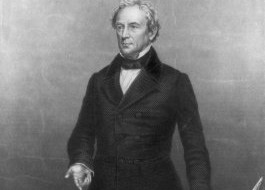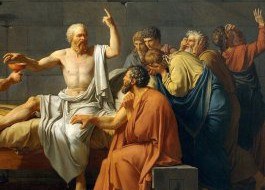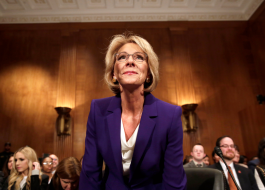
These days, even commencement speakers aren't safe from criticism aimed at their political or personal beliefs. President Obama, for example, gave the 2009 Notre Dame graduation speech and endured shouts of "baby killer!" in response to his position on abortion rights.
But the outcry over Obama's speech doesn't come close to the controversy that erupted when Evergreen State College invited Mumia Abu-Jamal — convicted of killing a police officer — to speak at its 1999 graduation.
Abu-Jamal was on death row at the time of the graduation, so Evergreen played a 13-minute tape-recorded speech for the audience. Abu-Jamal was removed from death row in 2011 and is currently serving a life sentence without the possibility of parole.
That decision spurred vehement outcry from many students, police officers, public officials offended by the decision, and some students walked out from the speech. Former Washington governor Gary Locke canceled his scheduled appearance.
 Jeff Myers, an officer with the Montesano, Wash., police department, stands with his back to the podium at the Evergreen State College graduation exercises Friday, June 11, 1999 in Olympia, Wash. AP Photo/Lauren McFalls
Jeff Myers, an officer with the Montesano, Wash., police department, stands with his back to the podium at the Evergreen State College graduation exercises Friday, June 11, 1999 in Olympia, Wash. AP Photo/Lauren McFalls
Former House Majority Whip Tom Delay even asked for a minute of silence on the floor of the House of Representatives to protest the decision.
For its part, Evergreen said it asked Abu-Jamal to speak ''to galvanize an international conversation about the death penalty, the disproportionate number of blacks on death row, the relationship between poverty and the criminal justice system,'' according to the New York Times in 1999.
Abu-Jamal, a former radio reporter who's black, was convicted in 1982 of murdering white Philadelphia police officer Daniel Faulkner after he pulled over Abu-Jamal's brother. He has a large number of supporters who claim he was framed for the murder, and, after a review of the case, Amnesty International found it did not meet international fair trial standards.
The speech that generated so much controversy centered on living a deliberate life and embracing the revolutionary struggle:
"This system's greatest fear has been that folks like you, young people, people who have begun to critically examine the world around them, some perhaps for the first time, people who have yet to have the spark of life snuffed out, will do just that: learn from those lives, be inspired, and then live lives of opposition to the deadening status quo. "

And he urged listeners to remember the revolutionaries who fought racial and social injustice that came before them:
"They chose the hard road of revolution, yet they chose. And but for that choice just like each of you seated here tonight, people who saw the evils of the system and resolved to fight it. Period."
Abu-Jamal has maintained his innocence, but the Supreme Court in Philadelphia upheld his conviction twice. He was sentenced to death, but in late 2011 prosecutors agreed to stop pursuing the death penalty and to take him off of death row.
He's serving a life sentence without the possibility of parole, but he's continuing to cause controversy behind bars. Abu-Jamal also gave a commencement speech at Goddard College in Vermont in 2014 that spurred fresh outrage from opponents of the decision. Again, the speech was pre-recorded from jail.
In April 2017, Abu-Jamal was again in court hoping a judge would overturn appeals previously denied, CBS Philly reported. The judge will give a decision at a later date.
You can listen to the entirety of Mumia Abu-Jamal’s 1999 speech here:




